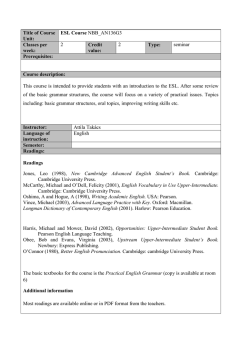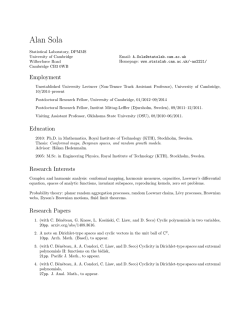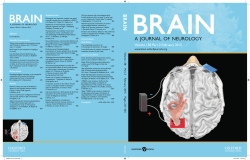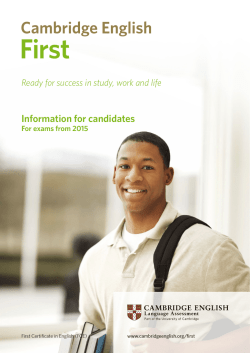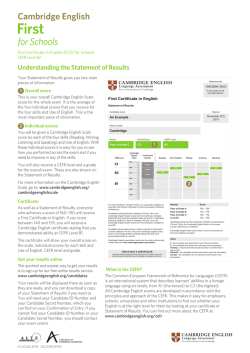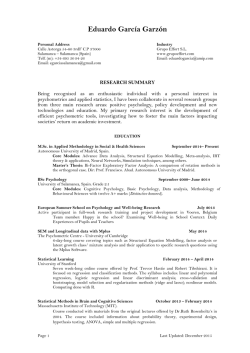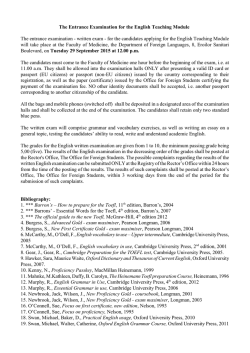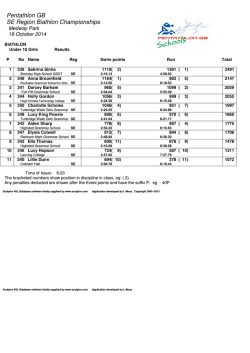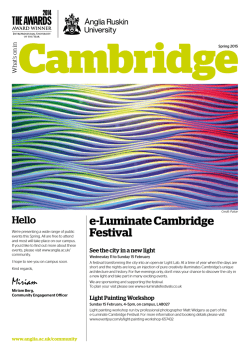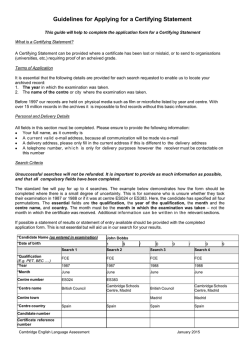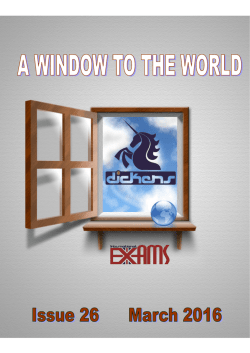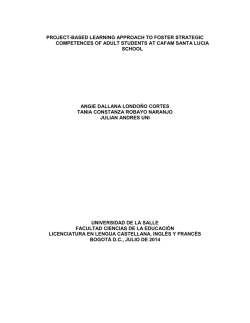
Bachelor Degree in Tourism and Hospitality Management
Bachelor Degree in Tourism and Hospitality Management Academic Year: 2015-2016 Teaching guide Area: English language Subject: English language I-1s (B2.1) Period: Semester 1 Lecturers: Ms. Anna Campañá Salsas Ms. Maeve Howley Publication for the exclusive use of the School of Tourism and Hospitality Management Sant Ignasi (Ramon Llull University). Total or partial reproduction is prohibited. MODULE: LANGUAGES AREA: ENGLISH LANGUAGE SUBJECT: ENGLISH LANGUAGE I-1S CODE: BA1ING-I LANGUAGE: ENGLISH YEAR: 1 PERIOD: SEMESTER 1 CREDITS: 3 ECTS 1. Subject objectives The aim of the course is for students to improve on and broaden their general level of English at B2 level and to prepare to take the First Certificate exam in May 2017 through the study of grammar, general vocabulary and the practice of speaking, listening, reading and writing skills. The students will also get to know specific terminology of the tourism sector. 2. Competencies developed Basic B01 - Be able to acquire, understand and structure knowledge. B02 - Be able to apply knowledge. B03 - Be able to search for and manage information in order to solve problems, transmit reflective judgements and/or make decisions. B04 - Be able to communicate information and/or knowledge in one´s mother tongue, as well as in at least two foreign languages. B05 - Be able to learn autonomously and continuously General G06 - Interpersonal Empathy/Comprehension: understands other people´s emotions, understands their points of view and is genuinely interested in their concerns. G07 - Team work and collaboration: Cooperates actively and jointly in achieving common objectives. G09 - Sensitivity and intercultural awareness: understands and interprets the influence of culture on the values and behaviours of individuals and organizations. 1 Specific E21 - Know the specific vocabulary of the different areas of the tourism sector in at least two foreign languages. 3. Content Week 1 Session 1 (Sep, 15/2015): Subject presentation: teaching guide Unit 1 A family affair Listening Part 1: Young people talking about their families and activities / Vocabulary: Phrasal verbs: get on with, do up,. Related material: Brook-Hart, G. (2014) Complete First. 2nd ed. Cambridge University Press. p.8-9 Session 2 (Sep, 17/2015): Unit 1 A family affair Reading and Use of English Part 6 Surviving teenagers. Related material: Brook-Hart, G. (2014) Complete First. 2nd ed. Cambridge University Press. p.10-12 Week 2 Session 3 (Sep, 22/2015): Unit 1 A family affair Grammar: Present perfect simple and continuous / Reading and Use of English Part 2: Doing the chores / Vocabulary: collocations with make and do . Related material: Brook-Hart, G. (2014) Complete First. 2nd ed. Cambridge University Press. p.12-14 Week 3 Session 4 (Sep, 29/2015): Unit 1 A family affair Speaking Part 1: Talking about yourself, your home, your family. Giving extended answers. Writing Part 1 An essay Teenagers and young people should share housework equally with their parents. Do you agree? Expressing opinions Using although, however, on the other hand and whereas.. Related material: Brook-Hart, G. (2014) Complete First. 2nd ed. Cambridge University Press. p.15-17 Session 5 (Oct, 01/2015): How to give an oral presentation: News of the day Vocabulary and grammar review Unit 1. Related material: Brook-Hart, G. (2014) Complete First. 2nd ed. Cambridge University Press. p.28 Week 4 Session 6 (Oct, 06/2015): Unit 2 Leisure and pleasure Oral presentation: News of the day / Listening Part 2: A talk from a games developer/ Grammar: Making comparisons . Related material: Brook-Hart, G. (2014) Complete First. 2nd ed. Cambridge University Press. p.18-19 Session 7 (Oct, 08/2015): Unit 2 Leisure and pleasure Oral presentation: News of the day Reading and Use of English Part 5: My first bike. Related material: Brook-Hart, G. (2014) Complete First. 2nd ed. Cambridge University Press. p.20-21 2 Week 5 Session 8 (Oct, 13/2015): Unit 2 Leisure and pleasure Oral presentation: News of the day. Vocabulary: phrasal verbs and expressions: take up, sum up, etc. /Grammar: Adjectives with -ed and -ing . Related material: Brook-Hart, G. (2014) Complete First. 2nd ed. Cambridge University Press. p.21-23 Session 9 (Oct, 15/2015): Unit 2 Leisure and pleasure Oral presentation: News of the day / Reading and Use of English Part 4: key word transformation. Related material: Brook-Hart, G. (2014) Complete First. 2nd ed. Cambridge University Press. p.23 Week 6 Session 10 (Oct, 20/2015): Unit 2 Leisure and pleasure Oral presentation: News of the day / Speaking Part 2: Comparing photos of free-time activities. Using discourse markers to structure the answer. Related material: Brook-Hart, G. (2014) Complete First. 2nd ed. Cambridge University Press. p.24-25 Session 11 (Oct, 22/2015): Unit 2 Leisure and pleasure Oral presentation: News of the day / Writing Part 2 An article: A leisure-time activity you really enjoy Writing compound and complex sentences / Unit 2 Vocabulary and grammar review . Related material: Brook-Hart, G. (2014) Complete First. 2nd ed. Cambridge University Press. p.26-27+29 Week 7 Session 12 (Oct, 27/2015): Unit 3 Happy holidays? Oral presentation: News of the day / Vocabulary: types of holiday and holiday activities / Listening Part 3: Five young people talking about their holidays . Related material: Brook-Hart, G. (2014) Complete First. 2nd ed. Cambridge University Press. p.30-31 Session 13 (Oct, 29/2015): Unit 3 Happy holidays? Oral presentation: News of the day / Vocabulary: types of holiday and holiday activities / Grammar: Past simple, past continuous and used to/ Vocabulary: travel, trip, journey and way . Related material: Brook-Hart, G. (2014) Complete First. 2nd ed. Cambridge University Press. p.31-32 Week 8 Session 14 (Nov, 03/2015): Unit 3 Happy holidays? Oral presentation: News of the day / Reading and Use of English Part 3: A bus journey / Grammar: at, in, or on in time phrases / Reading and Use of English Part 7: My nightmare holiday!. Related material: Brook-Hart, G. (2014) Complete First. 2nd ed. Cambridge University Press. p. 33-35 Session 15 (Nov, 05/2015): Unit 3 Happy holidays? Oral presentation: News of the day / Grammar: Past perfect simple and continuous . Related material: Brook-Hart, G. (2014) Complete First. 2nd ed. Cambridge University Press.p.36 Week 9 Session 16 (Nov, 10/2015): Unit 3 Happy holidays? Oral presentation: News of the day / Speaking Part 3 3: Discussing the benefits of different kinds of trip. Phrases to involve partners in discussion. Related material: Brook-Hart, G. (2014) Complete First. 2nd ed. Cambridge University Press. p. 37-38 Session 17 (Nov, 12/2015): Unit 3 Happy holidays? Writing / Unit 3 Vocabulary and grammar review . Related material: Brook-Hart, G. (2014) Complete First. 2nd ed. Cambridge University Press. p.50 Week 10 Session 18 (Nov, 17/2015): Unit 4 Food, glorious food Oral presentation: News of the day / Starting off / Reading and Use of English Part 6 Learning about food. Related material: Brook-Hart, G. (2014) Complete First. 2nd ed. Cambridge University Press. p.40-41 Session 19 (Nov, 19/2015): Unit 4 Food, glorious food Oral presentation: News of the day / Vocabulary: food, dish and meal / Grammar so and such. Related material: Brook-Hart, G. (2014) Complete First. 2nd ed. Cambridge University Press. p. 42-43 Week 11 Session 20 (Nov, 24/2015): Unit 4 Food, glorious food Oral presentation: News of the day / Listening Part 4 / Grammar too and enough. Related material: Brook-Hart, G. (2014) Complete First. 2nd ed. Cambridge University Press. p.44-45 Session 21 (Nov, 26/2015): Unit 4 Food, glorious food Oral presentation: News of the day / Speaking Part 4 / Reading and Use of English Part 1. Related material: Brook-Hart, G. (2014) Complete First. 2nd ed. Cambridge University Press. p.46-47 Week 12 Session 22 (Dec, 01/2015): Unit 4 Food, glorious food Oral presentation: News of the day / Writing. Related material: Brook-Hart, G. (2014) Complete First. 2nd ed. Cambridge University Press. p.48-49 Session 23 (Dec, 03/2015): Unit 4 Food, glorious food Oral presentation: News of the day / Vocabulary and grammar review Unit 4. Related material: Brook-Hart, G. (2014) Complete First. 2nd ed. Cambridge University Press. p.51 Week 13 Session 24 (Dec, 10/2015): Revision Units 1-4. Related material: Brook-Hart, G. (2014) Complete First. 2nd ed. Cambridge University Press. p. 8-51 Week 14 Session 25 (Dec, 15/2015): Oral exams. Session 26 (Dec, 17/2015): Oral exams. 4 4. Teaching methodology Finding information and preparation and organization of material. considered as a management activity such as organization of class notes, photocopying and managing library services Practical Exercises. performing exercises on the material that you work on in the subject area, supervised by the lecturer, that can be done individually or in groups, whose monitoring can either be done through virtual environments or in person. Self-study or Study Groups. Study related to content. Student Presentations (individual or group). presentation exercises on specific content assigned to a student. Plenary Lectures. presentation of content by presentation or explanation by a lecturer. Role-plays. technique through which a situation that occurs in real life is presented to the student who takes on the role of a particular person, and recreating a situation as if it were real in order to imagine and discuss how to act and take decisions in different situations. Virtual Networking. collaborative work on a virtual space designed by the lecturer and of restricted access, where you can share documents, work on them simultaneously, add new content, communicate synchronously and asynchronously, and participate in all discussions with members. Working individually or in groups. students perform work individually or in groups from the knowledge they acquire in this area. Debates. moderated discussion by the lecturer about issues and concepts related to the subject, between two or more groups of students. 5. Assessment activities Regular examination call • Partial exam (Individual - 20%) Evaluated competences: B1,B2,B3,B4,B5,G6,G9,E21 • Academic Work (Individual - 30%) Evaluated competences: B1,B2,B3,B4,B5,G6,G7,G9,E21 • Final exam (Individual - 50%) Evaluated competences: B1,B2,B3,B4,B5,G6,G9,E21 In order to pass the subject, the minimum mark for academic work and the final exam must be 5 or above. 5 The final exam consists of five parts (reading comprehension, oral expression, listening, use of English and writing) all of which must be completed in order for the student to be evaluated. In the case that a student does not take any part of the exam, or does not achieve the minimum mark required, the average will not be calculated and the student must retake the failed sections (academic work, partial exams and/or the final exam) in the re-sit examination call. In the event that a student passes the oral exam but fails the main written exam, the oral mark will be carried over to the re-sit examination. Resit examination call • Academic Work (Individual - 30%) Evaluated competences: B1,B2,B3,B4,B5,G6,G7,G9,E21 • Final exam (Individual - 50%) Evaluated competences: B1,B2,B3,B4,B5,G6,G9,E21 • Partial exam (Individual - 20%) Evaluated competences: B1,B2,B3,B4,B5,G6,G9,E21 The student must retake the sections that were failed or not attended (academic work, partial exams and/or final exam). Academic work will be recuperated by handing in a dossier of activities the details of which will be communicated to the student by the relevant teacher. The maximum mark for the dossier is 6/10. In order to pass the subject, the minimum mark for the academic work and the final exam must be 5 or above. In the case that a student does not sit for all the parts of the exam or does not reach the minimum mark, the student will fail the subject. Repeating students without attendance: regular examination call • Academic Work (Individual - 30%) Evaluated competences: B1,B2,B3,B4,B5,G6,G9,E21 • Final exam (Individual - 70%) Evaluated competences: B1,B2,B3,B4,B5,G6,G9,E21 The Coordinator will assign a teacher to each student. The student must contact or meet the teacher at the beginning of the semester to pick up the academic work and to find out about the final exam. In order to pass the subject the minimum mark for each section must be 5 or above. Academic Work: Should be handed in in 3 stages: 15/10, 15/11 and 15/12 according to the instructions of the teacher. The maximum mark is 6/10. 6 The final exam consists of five parts all of which must be fully completed in order for the student to be evaluated. In the case of a student not completing any of the parts of the exam or not reaching the minimum mark required, the average will not be calculated and the exam will be retaken in the re-sit examination call. Repeating students without attendance: resit examination call • Academic Work (Individual - 30%) Evaluated competences: B1,B2,B3,B4,B5,G6,G9,E21 • Final exam (Individual - 70%) Evaluated competences: B1,B2,B3,B4,B5,G6,G9,E21 The student must retake the sections which were not presented or those failed (Academic Work and/or final exam). In the case of the Academic work this will be retaken by the student handing in a dossier of exercises the details of which will be communicated to the student by the relevant teacher. The maximum mark will be 6/10. In order to pass the subject, the minimum mark for each section must be 5 or above. In the case that the student does not attend the re-sit examination or achieve the minimum mark, the average will not be calculated and the student will fail the subject. Follow-up meetings Week 3 (Oct, 15/2015), 10:00 Week 7 (Nov, 17/2015), 10:00 Week 13 (Dec, 15/2015), 10:00 6. Bibliography Mandatory readings Brook-Hart, G. (2014) Complete First. 2nd ed. Cambridge University Press.See chapters/pages1,2,3 and 4 Recommended readings BookTayfoor, S. (2004) Common mistakes at First Certificate and how to avoid them. Cambridge: Cambridge University Press. Hashemi, L. & Thomas, B. (2008) Cambridge grammar for First Certificate: self-study grammar reference and practice . Cambridge: Cambridge University Press. University of Cambridge ESOL examinations. Online FCE practice tests.[online]. Available at [Accessed 7 15 July 2015] Flo-joe. Online FCE practice tests.[online]. Available at [Accessed 15 July 2015] British Council Barcelona. Online FCE practice tests.[online]. Available at [Accessed 15 July 2015] K&J Pronunciation app This is an application which teaches you phonetics. It includes basic pronunciation of consonant and vowel sounds. Besides you can take some tests to help you to improve your pronunciation. Android Babbel app This app contains 2000-3000 words per language. All words are accompanied by images and pronounced for you by native speakers. IOS Android Zo Reader app Comprehensive epub, mobi, eBook reader seamlessly integrated dictionary. It provides instant definition lookup by tapping on a word without the need of internet access. Android 7. Lecturer/s Ms. Anna Campañá Salsas - [email protected] Contact hour: Tuesdays 15:30-16:30 She graduated in English and German Philology from UAB, Universitat Autònoma de Barcelona. Anna has been teaching English for many years. She joined HTSI Turismo Sant Ignasi, URL, in 1995, where she is currently coordinator of the 3rd and 4th year Bachelor degree in Tourism and Hospitality Management: She is teaching English on the first and second year Bachelor degree in Tourism and Hospitality Management. Ms. Maeve Howley - [email protected] Contact hour: Tuesdays in Room 103 - 105 from 1430hs - 1530hs, by appointment only B.A. in Fine Art (I.T. Sligo), P.G.C.E. in Art and Design (National College of Art and Design, Dublin), Advanced Diploma in Teaching English for Business (ESADE), RSA Certificate. Maeve spent many years teaching at ESADE in the undergraduate Law and BBA program as well as in the Executive Language Centre. She joined HTSI Turismo Sant Ignasi in 2015 and currently lectures on the undergraduate program in Tourism and Hospitality Management. 8. Observations * Information on the academic calendar, exam timetables, and room assignment will be posted on the virtual campus and on the faculty´s web site once it is available. * Academic norms and regulations is an obligation for all the members of the academic community in the faculty. *Evaluation: Students who miss any assessed activity such as oral presentations, debate participation, unit tests etc will get 0 for that activity. The lecturer is under no obligation to do it another day or accept homework handed in late. In the case of justifications for absence approved by the year coordinator (the student is in hospital or has had to attend court) these marks will not be taken into account. *Material: Students are expected to attend class with all the relevant material: course book, handouts, 8 photocopies where necessary. Failure to do so may result in students being asked to leave class. *Attendance: Each student is responsible for making sure they cover the material of classes missed. 9
© Copyright 2026
